The primary phrase that people tend to associate with The Hague is ‘war crimes’. In fact, despite being the third biggest city in the Netherlands and the seat of its government, many non-natives might struggle to come up with a second association. The city’s multiple international courts and history of prosecuting monsters like Slobodan Milošević and Jean-Pierre Bemba means it is perennially correlated with warmongering and genocide. Which is more than a little unfair considering it’s actually a very mild-mannered place, befitting a city that hosted the first ever Peace Conference in 1899.
I had previously been to Scheveningen, The Hague’s beach district, almost a decade ago during a period as a travelling poster salesman, yet it was such a brief visit that the only association I could add to ‘war crimes’ was ‘has a very good glow-in-the-dark crazy golf course’. However, after last weekend a further, finer distinction has been burned into my brain: ‘home of Rewire‘.
This is something that feels like it should register in more people’s minds, yet despite hosting such names as Modeselektor, Julia Holter, Gold Panda, Rustie and Godspeed You! Black Emperor over its six-year lifespan, and apparently enjoying several British media partnerships, Rewire has a curiously low profile in the UK. Several people who are usually clued-up about such events seemed nonplussed when I mentioned going this year, including one person who it turned out had even been approached to play it (something he only realised after being shown the line-up).
I too was ignorant before stumbling across Rewire while browsing tour dates earlier this year. The three-day event styles itself as “an annual international festival for adventurous music”, a succinct description and, looking at the line-up, clearly an accurate one. Having convinced fellow Monitorians Nicholas Burman and Patrick Swift that a trip to the Lowlands to see the likes of Mica Levi, Mykki Blanco and Babyfather was in order, we set off to see what Rewire was all about. This is what we discovered…
Despite the festival’s acts being split across eight separate venues, Rewire is surprisingly self-contained. The local nightlife is largely centred around the Grote Markt in the city centre, where The Hague’s main music venues sit practically opposite each other, while the (beautiful) churches that host several performances over the weekend are nearby as well. I think the longest we spend walking between venues is ten minutes, and that’s only because we get lost.
While the distances between them may be short, the distinctions between venues are gigantic; at least in regard to Grote Kerk (literally ‘Great Church’), where the opening performance takes place. The dimensions of this huge 15th century construct are only matched by our embarrassment when we ask a local where it is, only for him to bemusedly gesture to the behemoth standing directly behind us. The nearby Lutherse Kerk is far smaller but no less impressive inside, with low-hanging chandeliers and gigantic church organs bringing a sense of grandeur to the otherwise modestly decorated building.
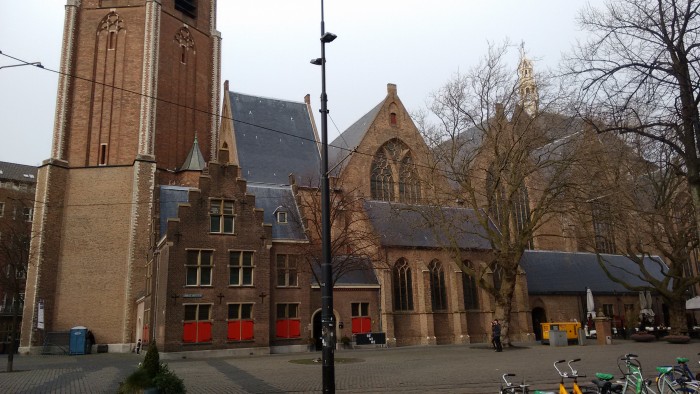
Grote Kerk – so big it won’t fit in a photo
The Nutshuis building is the festival’s nerve centre, hosting the ticket exchange, a record shop, food stalls and several talks over the weekend, while another ‘culture hub’, Prins 27, features an impressive main stage and Rewire’s best bar (the blonde beer is as tasty as the glasses it’s served in are unwieldy). Most of the action, however, takes place in Paard van Troje or ‘The Trojan Horse’, presumably named because it actually contains more than one venue within it. Which proves quite confusing when, on first entrance, we unexpectedly find ourselves watching what I later learn is a performance of Kurt Weill and Berthold Brecht’s ‘The Seven Deadly Sins’, which would’ve made for a rather striking change of musical direction for Brokenchord (who it transpires are playing the smaller room).
It’s also worth noting that the sound is exceptional in every venue (literally the only complaint is that the main room at Prins 27 was a little too quiet during Lakker’s set). This is probably the only time I’ve ever been able to say that about a festival, particularly one that must’ve been subject to a diverse range of tech specs. Rewire sound engineers – pat yourself on the back.
As for The Hague itself, while it’s not as attractive or exhilerating as Amsterdam, it’s a very pleasant place to wander around while waiting for the music to start. The Peace Palace is worth a visit and Scheveningen beach goes on for bloody miles (and includes the aforementioned crazy gold course). Also recommended is the bar next to Lutherse Kerk, and the cheap Italian cafe in between ‘Hans Sex Shop’ and ‘Willy’s Snackbar’ (heh) on Herengracht, where you can see Nick and Patrick enjoying a light aperitif and a quite astonishing array of free snacks (not pictured) below:
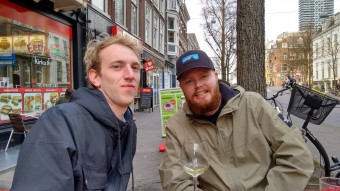
What with the city being located so near to the Hook of Holland, I’d recommend getting the ferry if you’re coming from London – you can book a return trip from Harwich International (including trains to/from Liverpool Street and The Hague) for under £100, with a surcharge for cabins on overnight trips. This option also means you get to enjoy Doggy TV and Deck Cam during the crossing, an audio-visual experience as challenging and thought-provoking as anything at Rewire itself. We’d also recommend staying in an Airbnb rather than a hostel, where you may find yourself being kept up all night by repeated plays of ‘Who Let The Dogs Out’ from the party next door.
What with The Hague being such an international city, it’s no surprise that it attracts a very international crowd. Punters hail from South Africa to Scotland, with plenty of people representing both North, South and Central America too. Most seem to be currently resident in The Hague however – in fact, several people ask us what we’re here for, and are surprised when we reply that the festival is the sole reason for our visit. Is that not reason enough?!
The crowd is also very diverse in terms of age, which is always good to see; at one performance I’d say there’s at least a sixty-year age gap between the oldest and youngest attendee, although the crowd gets increasingly younger, drunker and more energetic as the nights wear on. The most impressive thing, perhaps, is that the crowd never seems sparse – every performance in every venue, no matter how obscure, is at least three quarters full – yet somehow we never find ourselves queueing to get in anywhere. Can’t say I’ve ever experienced that at a city-based festival before. Perhaps that’s why Rewire still seems to be a relatively unknown quantity in the UK – they don’t want a bunch of pissed-up Brits to disturb this almost perfect audience equilibrium.
Well, this is why we’re here isn’t it? Although before the music starts we find ourselves at the first event, a panel discussion entitled ‘Remixing Places’, featuring Mikael Seifu and Yannis Kyriakides (plus the latter’s collaborator Andy Moor). The bad news is that the moderator (speaking in his second language, in fairness) begins with a long and meandering monologue before proceeding to confuse and even antagonise the guests with an oblique interview style. The good news is that their responses do include a few interesting nuggets, especially a discussion on sampling and copyright law (an area currently struggling to keep pace with technology) which leads to the amusingly frank admission that none of the artists feel under legal pressure when sampling because they ‘don’t make any money’.
The even better news is that Rewire only improves from this point. In fact, the next performance is close to the peak of the entire festival. The first ever recital of Mica Levi’s Under The Skin soundtrack, performed by Berlin’s s t a r g a z e ensemble (who we last saw with Julia Holter) is one of several premieres taking place at Rewire 2016, and the packed Grote Kerk suggests it’s the most highly anticipated too.
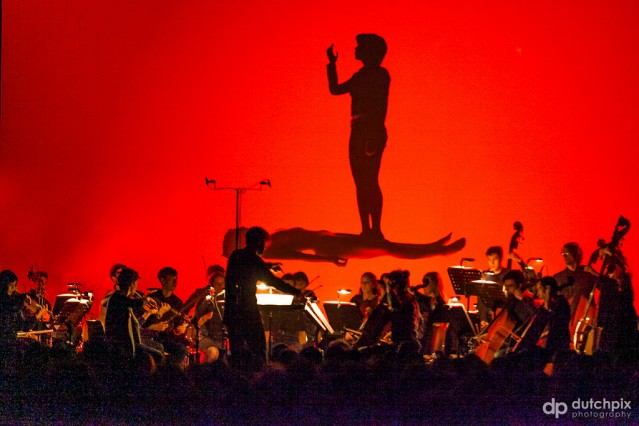
© Dutchpix Photography
While overheard mutterings on the way out indicate that not everyone had their expectations fulfilled, it’s pretty wonderful to these ears. While certain scenes are shown on a giant screen behind the orchestra, I keep my eyes shut half of the time, lost in sounds that seem to creep through the church like spectres. While the recurring bass/snare of the “main and only leitmotiv, a Hitchockian femme fatale melody of glissando strings” (I nicked that from our Soundtracked piece on it here) does get a little repetitive after the ninth time you’ve heard it, the gradually rousing recital of ‘Love’ is just incredible, surprisingly human and emotional for a film so focused on aliens and alienation. I feel genuinely privileged to witness it played so beautifully in this setting.
We then head off to another church, Lutherse Kerk, although admittedly only because we lose our way. It turns out to be a serendipitous detour though, as it means we unexpectedly catch the end of Kaitlyn Aurelia Smith‘s set. Her multi-layered sound is bright and enrapturing, seeming to sweep through every inch of the high-ceilinged building. I only wish we’d got there sooner, although we do get to see her workshop the next day which is pretty interesting (even if some of the high-end synth chat goes way over my head). I’ve been rinsing her recent EARS album ever since.
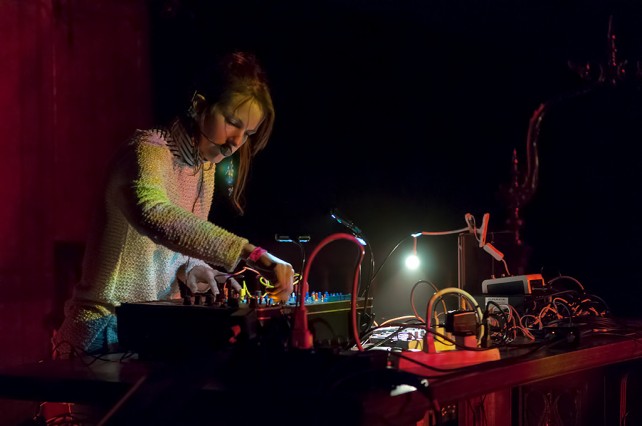
© Ed Jansen
Catching the last piece of a performance soon develops into a running theme. I’d not heard Brokenchord before but anything on Black Acre is always worth a listen, and here we witness something akin to a grittier Gold Panda, which is pretty great. We then head back to Lutherse Kerk for a bit of Kara-Lis Coverdale, whose agreeable soundscapes plot winding paths through the church, complete with the odd unruly root to trip you up.
By this point we’re starting to crave some beats though, so head to Paard to see Ninja Tune’s Iranian-born producer Ash Koosha. Unfortunately I leave something behind in the church so have to head back and thus miss most of his set. I’m told it’s full of ‘broken techno’ and ‘wild visuals’. Damn.
Luckily I’m safely back in the venue in time for Jlin’s set. To be honest I’ve never really been that into footwork so I wasn’t expecting much, but this is something else – not a second feels wasted as the rhythms spin around us in a blizzard of bass and snare. The most impressive thing about Jlin’s music though is the sense of space between the booming low end and the so-crisp-it-might-snap high end – both are so perfectly balanced it seems to create a vacuum in between that sucks you in without resistance. The fact she spends the whole set beaming increases the good vibes, and that grin is widely reflected across the crowd.
Having wanted to witness the Mykki Blanco stage show ever since I first heard ‘Wavvy’ back in 2012, I make sure I’m right at the front for the next set. This turns out to be a somewhat dangerous place to be however, as Mykki immediately starts tossing everything onstage around as soon as the set begins, including the stage monitors and some poor girl’s jacket (she later tells me some guy grabbed it and initially refused to give it back, believing it was actually Blanco’s).
The rest of the night gets increasingly debauched as a result, with Total Freedom and Peverelist soundtracking most of the action. The former’s set really explodes into life when he gets all junglist midway through, while the latter’s more cerebral approach takes the pace back down a touch, adorning the beats with the odd blissful synth dressing. The perfect way to draw the first night of Rewire to a close and take us (eventually) to bed.
Our first musical date on Saturday isn’t until 8pm, which is lucky as we’re all shattered. Luckily Anna Meredith is on hand to wake us all up with her tuba-powered barnstormer ‘Nautilus’, which I can confirm is the best piece of music to ever walk up a flight of stairs and enter a room to. Fucking brilliant. And impossible for the rest of the set to live up to unfortunately. While it contains enough quirks and harmonies to always keep you interested, Meredith’s music remains curiously hard to engage with, with tracks like ‘Taken’ sounding oddly twee in this environment. It’s never boring though, and a fine way to ease into the evening.
I’m not sure noisefiends Vessel, Black Rain and Pete Swanson have ever eased their way into anything to be honest, but the development of their once-in-a-lifetime live collaboration seems to have happened pretty smoothly. In fact, it turns out Swanson (formerly of Yellow Swans) and Stuart Argabright of Black Rain first met at the second edition of Rewire in 2012, making this unique performance with relative youngster Vessel also something of a reunion.
Looming over a table covered in gear, with Argabright occasionally switching to bass for feedback duty, the trio look like noise generals plotting an auditory assault. Which isn’t far from the truth, as it happens. However, the skill of all these artists is in how they approach quieter dynamics as well as testing the louder limits of the spectrum. That’s certainly the case here during an undulating set, the calmer passages of which make the more molten ones even more exhilarating. Argabright’s occasional grooving keeps it interesting visually too, although Vessel doesn’t even give us a wave when he exits the stage. How rude.
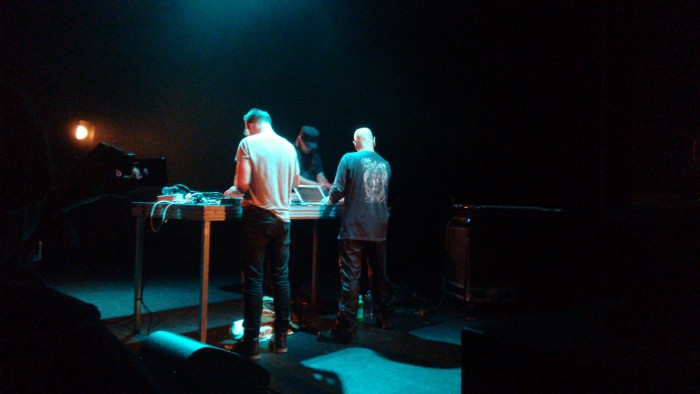
An even less compromising stage is set back at Paard, where Gazelle Twin‘s ‘Kingdom Come’ is in full swing. Or full sprint, as much of the performance sees GT and a similarly hooded accomplice on treadmills, perpetually running towards a screen at the back of the stage. I head to the viewing gallery for this one, which allows me to watch a third member of the group (BERNHOLZ, I assume?) manipulating pedals from his lofty perch. (I’m not the only one who spots him here though; at some point a photographer arrives and moves to take a shot, at which point he promptly puts his hood up too – much to the snapper’s chagrin.)
‘Kingdome Come’ is named after J.G. Ballard’s final novel, and the accompanying footage certainly contains the classic reference points of concrete car parks mixed with urban chaos. One excruciatingly sluggish progression down a carp park ramp prompts a grim chuckle when the sign at the end eventually reveals the statement: ‘DEAD SLOW’. The music meanwhile is suitably edgy, featuring Suicide-esque drones and yelps and lashings of heavy atmosphere. Not bad considering it’s only the second time it’s been performed.
The new Dean Blunt vehicle has already entered first gear when we arrive, although no further than that – the brightly-lit room is full of smoke and a repeated sample of someone (well done Crack magazine who somehow work out it’s Craig David) blandly intoning, “This makes me proud to be British”. Sensing this part of the show will probably go on for a while (and this was before I heard Babyfather’s BBF album) I nip out for a piss, only to almost not be allowed back in as the venue has suddenly filled up. I eventually manage to sneak past the bouncer, but in my partial absence Nick Burman is able to provide a fuller account…
“Last time I caught Dean Blunt he pitched his show: black. This time he whitewashed the audience with more spotlights than a finale at a Coldplay show and pumped so much smoke onto the stage I had to be told (reliably, I hope) that he had a Union Jack draped over a table on stage. ‘shook / motivation”s opening sample “This makes me proud to be British” looped for a while before Blunt and co. (again, am guessing this was DJ Escrow and Gassman, but no one could see a thing) came on stage and ran through the fresh Babyfather show. More dub and UK hip-hop influenced than the lo-fi indie of Black Metal, the best thing was watching the audience go from confusion to bobbing endorsement over the 45-minute set. He obviously has some lady hang-ups (working N.O.R.E.’s ‘Nothin” chorus into the set while complaining about an ex’s distate of his brothers; say ‘Inga’ at your peril), which objectively lead his lyricism into some icky territory. The thing is, I don’t know what makes Blunt so enticing, but the arch simplicity and visceral bass may have something to do with it.”
Cheers Nick. To be honest everything at this point was starting to get a little hazy (and not just because of the smoke billowing from Blunt’s stage), which is why we unexpectedly end up catching the second half of Battles’ set despite me being certain we’d already missed it. To be honest I’ve never been a big fan so wasn’t really bothered either way, even if David Jupp’s recent review had piqued my interest a little. That ambivalence soon dissolves though as we enter Paard’s larger room to hear the unmistakeable refrain of ‘Atlas’. That track has always been a surefire banger and so it proves here with an incendiary rendition, although even more impressively the rest of the set manages to keep up the pace. Probably the furthest my expectations were surpassed all weekend – Battles, you may well have a new convert.
After this things get even hazier, and I spend most of Not Waving’s set looking for something I’d dropped on the floor; the same thing I’d dropped the night before funnily enough (Christ I’m making myself sound like a right feckless twat in this review). This is a shame as I’m a fan of Not Waving’s Animals album, but here all it did was add an extra layer of anxious intensity to my fruitless exploration of the floor. Patrick, who’s less of an idiot and therefore paid a bit more attention than I did, said it was ‘a bit too 2008 Boys Noize for me’. So there you go.
And that was pretty much that for our Rewire 2016 experience. There is another day of music scheduled, but sadly our respective travel plans nix a potential third session in The Hague. I’m gutted to miss another opportunity to see Colleen again, but it says a lot that even two thirds of Rewire’s annual offering still seems like excellent value. Fans of adventurous music: your next adventure begins here…
Words: Kier Wiater Carnihan, Nicholas Burman and Patrick Swift
Photos: Ed Jansen and Dutchpix Photography
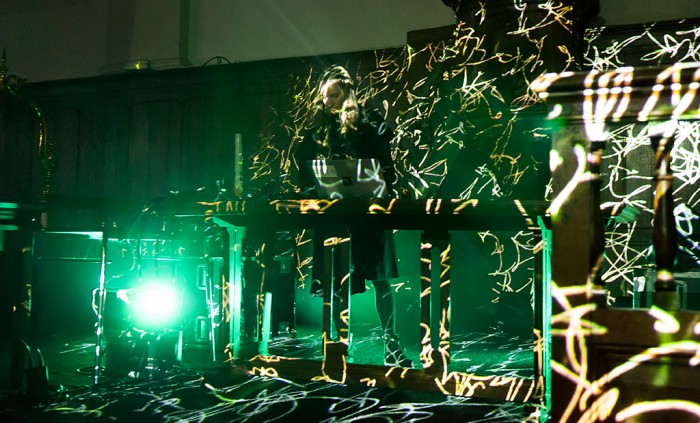
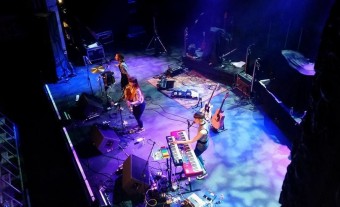



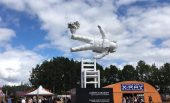
Follow us
Follow us on Facebook Follow us on Twitter Follow us on Google+ Subscribe our newsletter Add us to your feeds